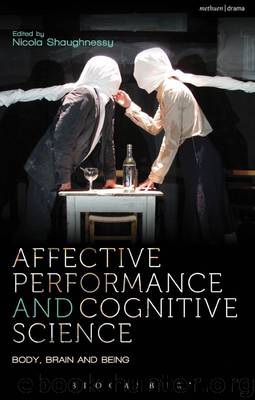Affective Performance and Cognitive Science: Body, Brain and Being (Performance and Science: Interdisciplinary Dialogues) by Nicola Shaughnessy

Author:Nicola Shaughnessy [Shaughnessy, Nicola]
Language: eng
Format: azw3
ISBN: 9781408183694
Publisher: Bloomsbury Publishing
Published: 2013-12-05T05:00:00+00:00
7
Embodied Memory and Extra-Daily Gesture
Neal Utterback
An actor friend of mine at a major American graduate acting programme complained to me that he has trouble memorising text and that through all of his training no one had ever really given him substantial advice on how to do so. After a long discussion about his personal technique he finally explained that he often works on text in bed before sleeping. What about that scenario, I wondered, might be interfering with his memorisation? Recent research in embodiment within cognitive science is continually showing us that the body and mind are fully integrated as one unit. While the sciences are beginning, more and more, to see the connection between the body and memory and, in particular gesture and memory, much more discussion of this connection needs to be had among theatre scholars and practitioners.1 It is common to hear actors complain that it is difficult for them to memorise text prior to rehearsal. However, very little advice or training is typically geared towards aiding actors in the acquisition of skill. This may be in large part due to the fact that we still know precious little about how the human agent maximally accomplishes this task.
Memory is at the heart of everything we do in and out of the theatre. As Anne Bogart writes in A Director Prepares: ‘The act of memory is a physical act and lies at the heart of the art of the theatre. If the theatre were a verb, it would be “to remember”.’2 Yet memory gets far less attention in our acting theories than it should given how profound it is to our total experience. Certainly actors rely heavily on their memory systems whether to recall text, blocking, or, simply, the location of the theatre and what time to show up to perform or rehearse. Certainly theorists like Lee Strasberg expect the actor to be able to recall events from her life to tap into emotionally relevant material.3 But neither Strasberg nor most other theorists give any falsifiable evidence in support of how this is done. Additionally, while there is an increased interest in daily gestures within cognitive science, there is little examination of extra-daily, theatrical gestures used by actors.4 In this chapter I will reveal, through empirical study, that gesture is remarkably important to how and to what degree of success the actor is able to store and remember text. Memory is a physical act. I will show that gestures aid in the acquisition of text for the actor and restriction of the hands actually produces a degraded performance of that text.
Using the theories and methods of cognitive science will afford me advantages in the observation of theatrical, performed phenomenon, specifically that of gestures. Moreover, those observations will be rooted in repeatable measures with quantifiable results instead of the subjective or folk assumptions we have been previously reliant upon. In his 2007 paper ‘Falsifiable Theories for Theatre and Performance Studies’, Bruce McConachie expresses concern that our major theories of acting cannot stand up to the same rigorous falsifiability that good science can.
Download
This site does not store any files on its server. We only index and link to content provided by other sites. Please contact the content providers to delete copyright contents if any and email us, we'll remove relevant links or contents immediately.
| Administration & Medicine Economics | Allied Health Professions |
| Basic Sciences | Dentistry |
| History | Medical Informatics |
| Medicine | Nursing |
| Pharmacology | Psychology |
| Research | Veterinary Medicine |
The Art of Thinking Clearly by Rolf Dobelli(10450)
The 5 Love Languages: The Secret to Love That Lasts by Gary Chapman(9784)
Mindhunter: Inside the FBI's Elite Serial Crime Unit by John E. Douglas & Mark Olshaker(9317)
Becoming Supernatural by Dr. Joe Dispenza(8199)
Nudge - Improving Decisions about Health, Wealth, and Happiness by Thaler Sunstein(7689)
The Road Less Traveled by M. Scott Peck(7592)
Mastermind: How to Think Like Sherlock Holmes by Maria Konnikova(7320)
Enlightenment Now: The Case for Reason, Science, Humanism, and Progress by Steven Pinker(7306)
Win Bigly by Scott Adams(7183)
The Way of Zen by Alan W. Watts(6600)
Factfulness: Ten Reasons We're Wrong About the World – and Why Things Are Better Than You Think by Hans Rosling(4730)
The State of Affairs by Esther Perel(4711)
Gerald's Game by Stephen King(4640)
Man's Search for Meaning by Viktor Frankl(4576)
The Confidence Code by Katty Kay(4251)
Thinking in Bets by Annie Duke(4216)
The Healing Self by Deepak Chopra(3568)
Hidden Persuasion: 33 psychological influence techniques in advertising by Marc Andrews & Matthijs van Leeuwen & Rick van Baaren(3550)
The Worm at the Core by Sheldon Solomon(3484)
